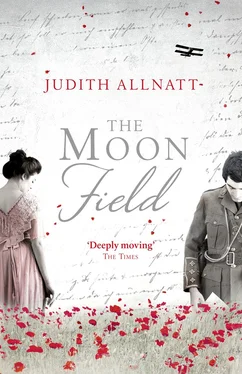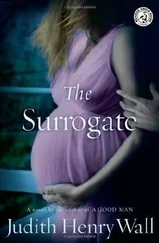She nodded. ‘The new film still isn’t as close to a natural palette as one would like; it’s better than monochrome though.’
‘Except for in the snow,’ George said.
That smile again. George’s heart turned over. ‘I prefer painting,’ he blurted out; then, fearing he’d been rude: ‘I mean you can get the real colours then, all of them. I like going up on the fells in the evenings when there are greys and purples and the rust of the bracken, not just green, the slopes aren’t ever just green …’
She looked at him then. Not as if he was being dull, as his little brother, Ted did, or as if he was unhinged as Arthur had once when he spoke to him about painting, but as if she was really, truly listening. She said, ‘… and clouds aren’t ever only white any more than the water’s ever only blue. Do you go down to Derwentwater to paint?’
‘Sometimes,’ George said, ‘and out on the tops: Cat Bells, Helvellyn. But I haven’t always got paints; sometimes I sketch. It’s expensive, you know.’
‘I don’t always take the camera,’ she said, ‘sometimes I just sketch too.’ She held out her hand. ‘Violet Walter. I live back there.’ She pointed towards the trees, beyond which, George knew, lay only one house, the Manor House with its grey roofs and many chimneys, impressive even against the rising ranks of evergreens that finished like a tideline halfway up the huge bulk of Ullock Pike, which over-towered all.
‘George Farrell,’ he said, taking her pale, perfectly smooth hand in his, then letting it go quickly in fear that she would think him too familiar. ‘P-P …’ he stuttered over the word ‘postman’.
‘Painter,’ she said and smiled.
That had been in May. The first month he had looked for her often but his searching had been in vain because he had later learnt that she had been away. She told him that she had been staying with Elizabeth Lyne, an old school friend in Carlisle: describing another world of tea taken on the lawn, with white cloths under spreading elms, and dancing after twilight, music spilling like magic from the open throat of the gramophone.
He had kept looking and had eventually been rewarded. Sometimes he just glimpsed a distant figure on the hillside as he passed with his bike and bag along the road below; then she would raise her hand to him and he to her, in salutation. Sometimes she would be coming towards him from home with her camera in its leather box slung across her shoulder and he would give her the letters for the house. Almost every day, in among a sheaf of bills in brown envelopes, there would be one creamy envelope for her with a Carlisle postmark. She would shuffle through the letters until she saw it and then stow it in one pocket and put the rest in the other. He imagined that she must miss her friend badly and feel the isolation of the spot after her companionable stay in the town.
When he had passed over the letters, he would turn around so that he could walk with her a while. He would wheel the bike alongside; her camera stowed with the post in the basket so that she might have a hand free to hold her long skirt clear of the dusty road. If she had letters of her own to send, in the pale blue envelopes she favoured, they would walk first to the postbox before strolling on, out into the countryside. Sometimes, the best times, when he climbed a track to one of the lonely hill farms, he would come across her leaning on a gate looking out over the valley and he would join her to share the view. They talked of the way the clouds chased the light over the hills, and of the hawks nesting in the copse near the house, which hovered, dark specks in the heavens, giving perspective and making the piled clouds mountainous.
George learnt that she was older than he was by three years. ‘An old lady of twenty-one,’ she said. An only child, she had been educated at a boarding school in Carlisle, then a finishing school in France. She spoke of its beauty: the French countryside softer than Cumberland with hedges rather than walls, low slopes and wide plains of rich pasture and standing crops. She described the rocky coast of Brittany, its crashing waves and spume-filled air, and a Normandy beach with a wide arc of sand, which she had walked from end to end, slipping away from her school party to watch the gannets dive like black arrows into the sea. Her eyes lit up as she told him of such things and she motioned with her hands to trace the sweep of the bay or the birds’ headlong plunge. Once he told her that looking out over the lake from the top of the fells was what made him certain that he had a soul, and she had touched his arm and said, ‘Yes, yes.’
He had told her how it had been at his school. How he was different, always in trouble when the master asked him a question and he was unable to answer because he had been staring out of the window at the clouds, making dragons and faces and genies from their ever-changing shapes. He had said less and less the more he grew afraid that he would get it wrong, until the other children called him ‘moony’ and ‘idiot’ and ‘simple’.
‘You’re far from simple, George,’ she said. ‘They mistook the distraction that comes from hard thought for no thought at all, and that’s their error.’ She touched his sleeve again and he thought his heart would burst with pride because although Kitty and his mother had always said such things this was different.
When she spoke of her parents, she always had a note of worry in her voice. Her father was often abroad attending to his business interests, leaving the land and Home Farm to the estate manager, and her mother to her own resources. Mrs Walter, too much alone, suffered ‘sick-headaches’ and fatigue and often withdrew to her room. Violet once let slip that her father, even when back in London, frequently stayed at his club and George wondered what had caused the breach between her parents, but asked no further, guessing at the hurt that a daughter would feel to know that she was not enough to tempt a father home.
From her room, Mrs Walter instructed the housekeeper, Mrs Burbidge, and took her lunch on a tray. Afterwards she wrote letters, but later in the afternoon, she required Violet’s company, wanting her to sit with her and talk or read aloud. As the sun grew hotter in the afternoon, George would notice Violet glancing back at the copse within which the house was hidden or at her silver wristwatch. He would rack his brain for a question. ‘What was the town like, where your school was? What did you sketch on your picnics?’ Anything to stop her saying the words he dreaded: ‘I must go.’
George rattled the latch of a garden gate and then stood stock-still to listen, in case he had missed the Moot Hall bell. He heard nothing but nonetheless quickened his pace, the bike wheels juddering as he turned into Leonard Street where he lived. As he bumped the bike to a stop outside the house, his mother came to the door to meet him carrying a package wrapped in paper and with Lillie hanging on to her apron and sucking her thumb.
‘I thought I heard you; you made such a clatter,’ his mother said. ‘Have you got a bit behind?’ She passed him the package of sandwiches and a billycan of cold tea.
‘Carry!’ Lillie said and let go of the apron to lift her arms up to him.
‘You mustn’t get behind, George. Mr Ashwell’s a tartar for punctuality.’
‘Carry!’ Lillie said again, imperiously, and George put the food down on the step and lifted her under the armpits: a bundle of warm body and petticoats. He put her on his shoulders where she grabbed on to handfuls of his hair.
‘Ow! Lillie!’ he said and loosened her fingers, laying them flat against his head.
‘Horsy! Horsy!’ Lillie said and George held on tight to her skinny knees and jogged obligingly up and down the street.
Читать дальше












